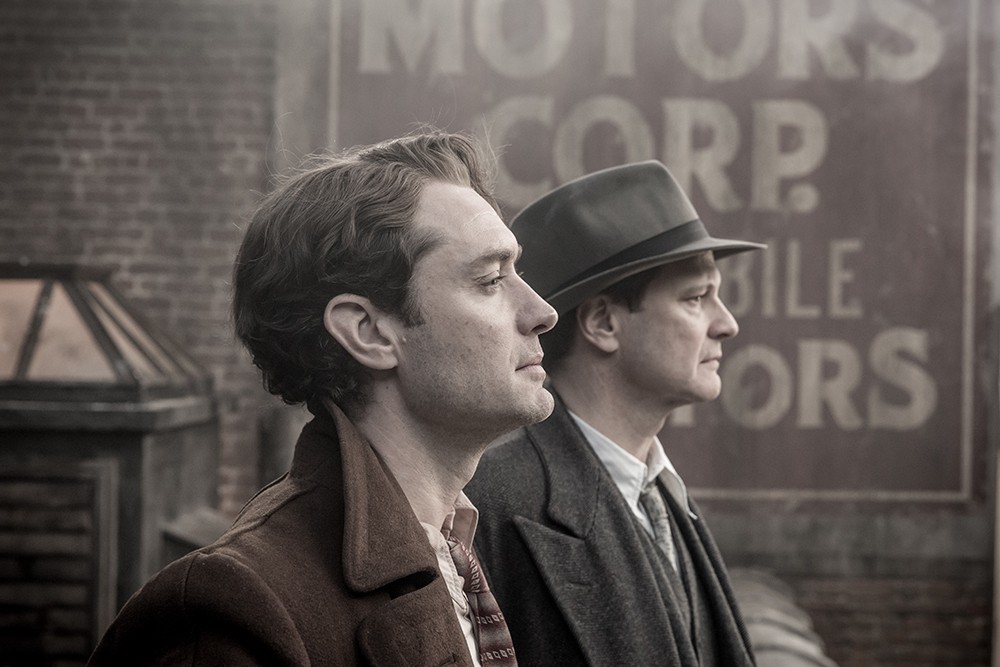Genius
Genius, 2016, 2 ¾ stars
Genius examines famous editor-writer relationship
From The Orlando Weekly, June 15, 2016
Thomas Edison claimed genius was 1 percent inspiration and 99 percent perspiration. Well, after watching the new drama about the relationship between author Thomas Wolfe and his editor, one might say that genius, at least in the literary world, is equal parts writing and editing.
Directed by Michael Grandage, who is better known as a theater director and actor, Genius examines the professional and personal bond between Wolfe (writer of Look Homeward, Angel and Of Time and the River) and Scribner’s editor Maxwell Perkins in the late 1920s and 1930s. Perkins, who also edited the works of Ernest Hemingway and F. Scott Fitzgerald, discovered and nurtured Wolfe while dealing with the novelist’s psychological instability, alcoholism and extraordinarily profuse, belletristic output.
“I know I seem like a freak: too loud, too grandiose. That’s who I am,” Wolfe tells Perkins. “But I feel things like a real person.”
Genius is enjoyable because of its fascinating story, the type one rarely sees on screen. In fact, I can’t recall another film that delves into the minutiae of editing quite like this. Regrettably, though, much of it execution is poor, as the film can’t seem to decide whether to make Perkins or Wolfe the main character and isn’t good at making them co-leads. Colin Firth, as Perkins, give the best performance but has little chemistry with Jude Law (Wolfe), who exhibits enormous energy but not enough believability.
“Human beings aren’t fiction,” Wolfe is told. Yet, in Genius, he seems just that: a fictional entity drifting toward caricature. (And Law’s attention-grabbing and slightly inconsistent North Carolina dialect doesn’t help.) But when combined with Firth’s steady hand and the fact that the script is remarkably faithful to reality, Law’s performance is tolerable.
As Wolfe’s older mentor and lover, Nicole Kidman is about as effective as she can be considering her underwritten character, while Laura Linney (as Perkins’ wife) also does a nice job handling a role that gives her little to do. I was actually more fascinated with Guy Pearce as Fitzgerald and Dominic West as Hemingway. Though the two literary giants don’t get much screen time, they make the most of it, particularly Pearce, who lends credibility to a script that is sometimes detached from reality, overly theatrical and poorly structured. Ironically, it would have benefitted from Perkins’ editing. Without it, it is merely acceptable and not quite worthy of its subjects.
The screenplay by John Logan is based on the 1978 book Max Perkins: Editor of Genius by A. Scott Berg, but who’s to say what defines genius? Perhaps the strength of the film – and the chief reason I’m recommending it – is that it challenges us to define genius ourselves. There’s the genius of originality that springs from creation, exhibited by Wolfe. But there’s also the genius of patience, collaboration, judgement, refinement and friendship. That’s editing – and its praises are long overdue.
Perkins would argue, however, that “editors should be anonymous.” We’re just lucky that relative anonymity has been cinematically stripped from this particular editor. He deserves it.
© 2016 Orlando Weekly / MeierMovies, LLC
